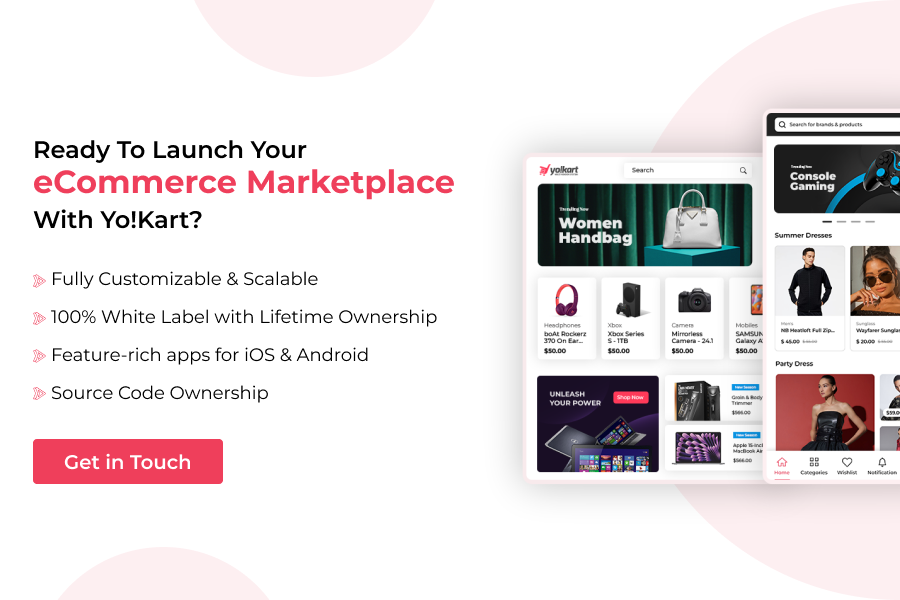As global markets accelerate toward digital commerce, multi-vendor eCommerce marketplaces have emerged as the cornerstone of a scalable digital transformation. These marketplaces go beyond expansion for enterprises, serving as strategic growth drivers for diversification, customer engagement and sustainable revenue growth.
Yet, building a well-structured, enterprise-grade multi-vendor eCommerce marketplace requires a technologically resilient platform, one that is capable of handling complex operations and scaling effortlessly as the business grows.
This is where multi-vendor eCommerce platforms prove indispensable.
The ideal multi-vendor eCommerce platform combines architectural flexibility and operational efficiency that enables enterprises to innovate confidently. Howsoever, with countless solutions competing in the industry, choosing the right multi-vendor eCommerce platform becomes a strategic imperative that can define long-term success.
In this blog, we’ll explore the best multi-vendor eCommerce platforms for enterprises, evaluating their core capabilities and advantages to help you make an informed decision.
Table of Contents
Why Enterprises Need a Robust Multi-vendor eCommerce Platform?
Operating a multi-vendor eCommerce marketplace at an enterprise scale offers huge growth potential, however, it often brings some complex operational challenges. This is why businesses need a robust, scalable multi-vendor eCommerce platform to innovate confidently.
Here’s why businesses need a robust multi-vendor eCommerce platform:
- Faster Time-to-Market: A sophisticated multi-vendor eCommerce platform accelerates market launch by offering pre-built frameworks, market-ready features and optimized workflows, instead of developing everything from the ground up.
- Lower Development Costs: Developing an enterprise-grade marketplace from scratch demands considerable investment in planning, coding, design and testing. A proven multi-vendor eCommerce platform minimizes these costs by offering built-in features and functionalities, significantly by up to 5 times.
- Proven Platform Stability: Robust multi-vendor eCommerce platforms are already tried and tested frameworks that ensure stability and uptime reliability even with high vendor volumes and peak seasonal demand, reducing the risk of encountering any bugs or downtime errors.
- Scalable Architecture: Scalability becomes a defining factor as the marketplace grows. A well-architected multi-vendor eCommerce platform allows enterprises to expand effortlessly, ensuring smooth performance and operational flexibility as the business evolves.
- Easy Customization & Extensibility: Enterprises often have unique workflows, branding needs and integration requirements. A reliable multi-vendor platform provides modular architecture and plugin extensibility, allowing full customization and innovation aligned with strategic goals.
- Enhanced Security & Compliance: Enterprise-grade multi-vendor eCommerce platforms adhere to strict data protection laws and local regulatory standards in order to safeguard user data and maintain privacy. This helps businesses comply with local regulations and protect themselves from any unnecessary conflicts.
- Quick ROI: By minimizing the development cycles and enabling faster deployment, multi-vendor eCommerce platforms enable businesses to drive a quick return on investment.
Top 10 Best Multi-vendor eCommerce Platforms for Enterprises
The eCommerce industry comprises several multi-vendor eCommerce platforms competing for attention. Here’s a list of top 10 best multi-vendor eCommerce platforms for enterprises, curated to help you make an informed decision.
1. Yo!Kart
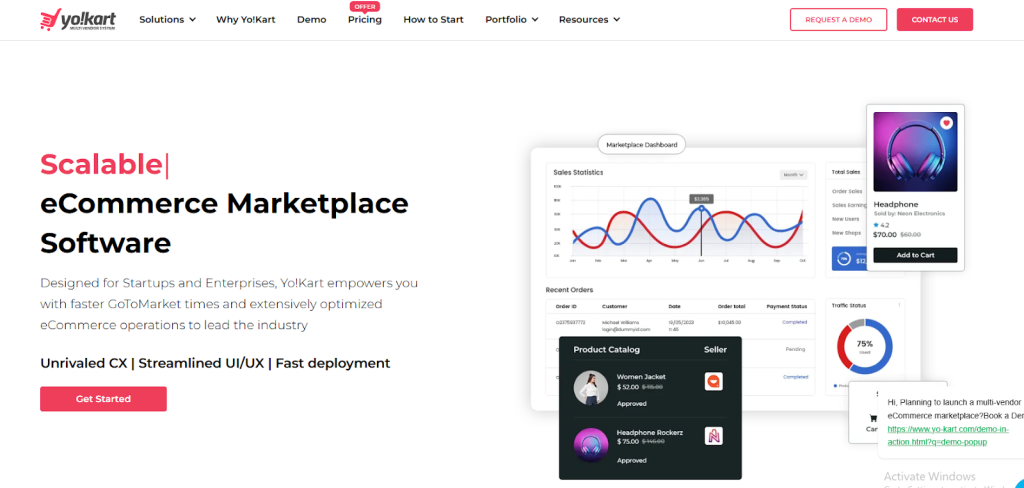
Yo!Kart is a scalable robust multi-vendor eCommerce platform that allows businesses to launch enterprise-ready multi-vendor marketplace quickly and cost-efficiently, without getting into the complexities of custom development. Yo!Kart supports various business models, whether B2B, B2C and others, allowing businesses to cater their various requirements and adapt the platform accordingly.
The software integrates with various built-in features such as vendor management, secure payment gateways, advanced analytics dashboard, multi-language & multi-currency support and advanced B2B workflows to build a fully functional & powerful multi-vendor marketplace. Additionally, Yo!kart is known for its extensively scalable solution that allows businesses to adapt to platform growth.
The software boasts an intuitive, user-friendly interface that is highly configurable and mobile responsive. Yo!Kart also offers mobile-ready apps for both buyers and sellers for efficient operations management. In addition, Yo!Kart stands out for its self-hosted infrastructure that offers flexibility to manage the software on your preferred server.
Salient Points:
- 100% white-label solution with rebranding flexibility
- Offers a lifetime license for a one-time upfront payment
- Integrates advanced eCommerce-ready features
- Supports multiple languages and currencies
- Highly scalable; grows with your business
- Can be customized to support unique business requirements
- Free technical support for 1 year after the purchase
- Has powered over 5000 marketplaces across the globe
Ratings: 4.8/5
Book a Free One-on-One Demo Session for Yo!Kart
2. BigCommerce
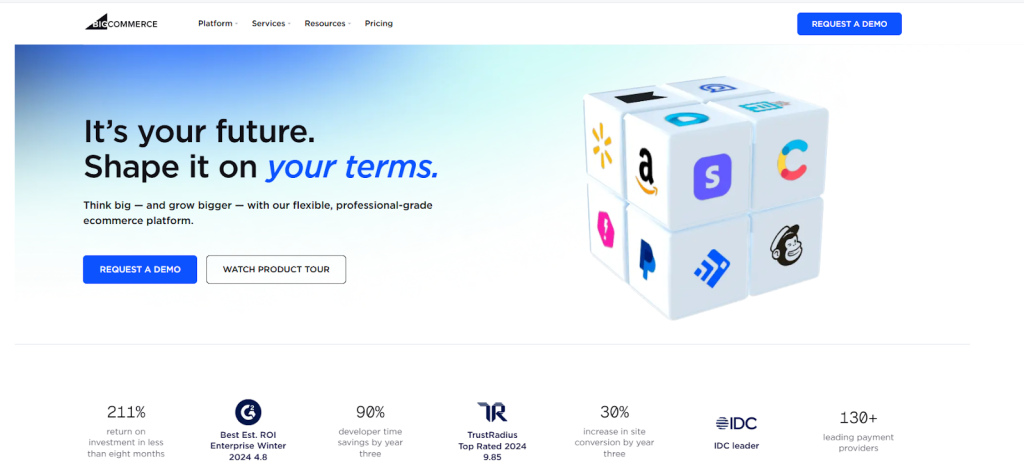
BigCommerce is a reputed SaaS-based eCommerce platform that allows businesses to launch multi-vendor marketplaces effortlessly. The software offers an open SaaS architecture that provides businesses with the strength of SaaS software and the flexibility of open APIs.
The software is engineered to support complex operations and handle increasing traffic at its core without any compromise. Its modular design allows businesses to adapt to the increasing demands and grow with the business. Moreover, the platform also supports PCI DSS compliance, is GDPR-ready and integrated with secure payment gateways. However, its API-first approach requires a skilled team of developers to build custom multi-vendor capabilities or integrate 3rd-party marketplace solutions like Webkul.
Salient Points:
- High-performance SaaS infrastructure
- Expansive API coverage for deep customization
- Offers multi-storefront management
- Quite complex interface compared to other solutions
- No in-built email marketing tools reported by users.
Ratings: 4.2/5
3. CS-Cart
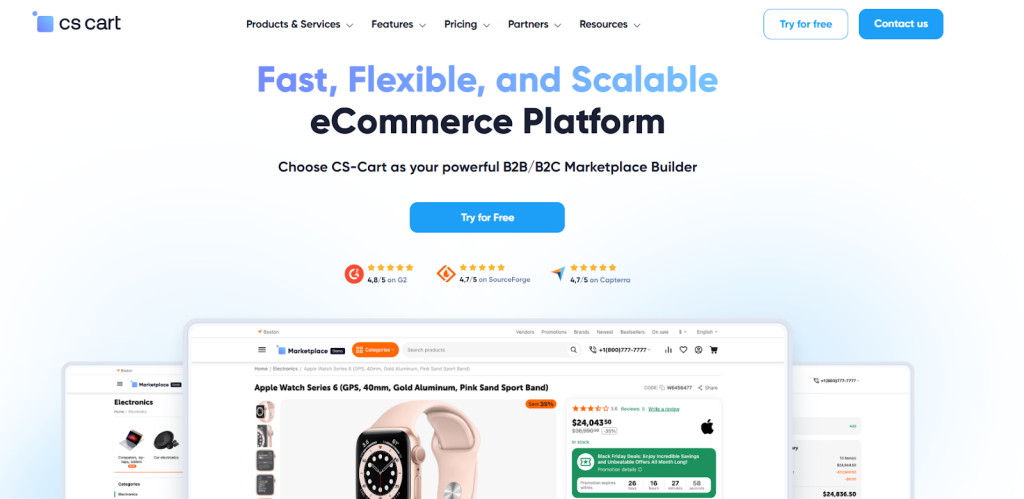
CS-Cart is one of the renowned eCommerce solutions that provides marketplace owners with complete control over their online marketplace ecosystem. Known for its self-hosted and modular architecture, CS-Cart provides a strong foundation for businesses with large scale operations that requires high scalability and performance. The platform offers sophisticated vendor management system where sellers can independently oversee the key aspects such as catalogs, orders, performance and more, whereas admins retain complete governance over the same.
Whether trying to build a B2C marketplace, B2B website or a multi-vendor niche ecosystem, CS-Cart allows to innovate the platform to your unique needs. However, it demands high technical expertise to scale for implementation and scaling the platform.
Salient Points:
- Self-hosted eCommerce platform
- High costs compared to other self-hosted solutions
- Comprehensive product management features
- Robust functionality without integrating numerous add-ons separately
- Supports unlimited products, sellers and storefronts
Ratings: 4.6/5
4. Shopify Plus

Shopify Plus is a premium eCommerce marketplace platform that is engineered to meet the demands of businesses with large scale operations. While Shopify Plus is not inherently a multi-vendor eCommerce platform, it offers seamless integration and compatibility with famous marketplace extensions like Webkul and more.
Backed by Shopify’s SaaS-based infrastructure, Shopify Plus offers businesses with high reliability and operational resilience to operate seamlessly with precision. Additionally, the platform complies with industry-best security practices to safeguard user data and privacy.
However, despite its many benefits, the software relies heavily on third-party extensions to extend its functionalities, which as a result, also adds cost and complexity to the operations.
Salient Points:
- Offers full control over checkout flows and third-party integrations
- Enables multi-currency, multi-lingual and region-specific storefronts
- SaaS-based infrastructure with recurring subscriptions costs
- Limited ownership and data control
- Relies heavily on third-party integrations
Ratings: 4.4/5
5. Mirakl
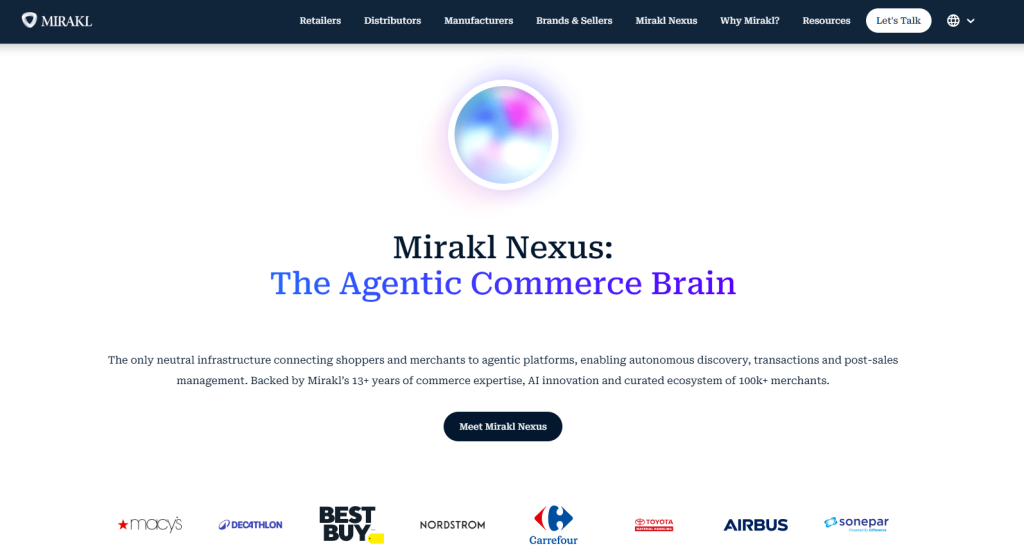
Mirakl stands as a turnkey, reliable multi-vendor marketplace solution, purpose-built to endow businesses in launching powerful multivendor marketplaces.
Its SaaS-based architecture allows businesses to integrate marketplace capabilities into existing digital ecosystems. Its integration-first ecosystem ensure connectivity with several third-party system like ERP, CRM and others seamlessly.
The platform offers exceptional suite of marketplace features for end-to-end marketplace management. Its API-driven ecosystem allows businesses to tailor the website to their brand ethos, offering exceptional extensibility.
Furthermore, its integration-first approach allows businesses to scale without compromising performance. The software is designed with a strong emphasis on multi-vendor functionality and agility, enabling enterprises to operate multi-vendor operations efficiently.
Salient Points:
- Scalable solution and compliant with industry-best practices
- Enables seamless integration with ERP, CRM, etc.
- Global payment processing and seller payouts
- Supports both B2B and B2C eCommerce marketplace models
- High costs with revenue-based pricing control
Ratings: 4.5/5
6. WooCommerce
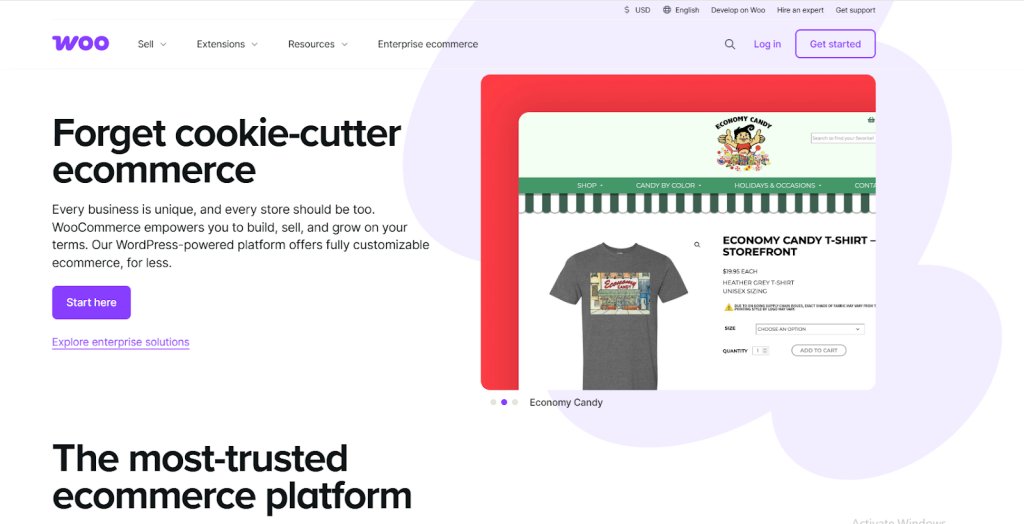
WooCommerce is a WordPress-based eCommerce platform that has now long been a preferred choice for businesses looking for a cost-effective yet scalable solution. While it’s originally designed for singer-vendor setups, WooCommerce’s expansive set of plugins and third-party integrations like Dokan and WCFM Marketplace transforms it into a multi-vendor storefront.
WooCommerce’s open-source architecture makes it exceptionally adaptable for large scale businesses that require complete control over functionality. When combined with optimized hosting solutions, the platform can handle increasing traffic, extensive product catalogs and transactions.
Its vast plugin ecosystem makes it highly extensible software, allowing businesses to tailor the platform according to their needs. However, it can be complex to manage the software due its vast plugin ecosystem and may increase costs over time. Additionally, businesses will need a skilled team of in-house developers for feature development and integrations.
Salient Points:
- Customizable shipping and tax options
- Open-source software with no transaction fees of WooCommerce itself
- Requires regular maintenance and updates
- May become slow with extensive plugins installed
- Technical expertise needed for development and customization
Ratings: 4.4/5
7. Arcadier
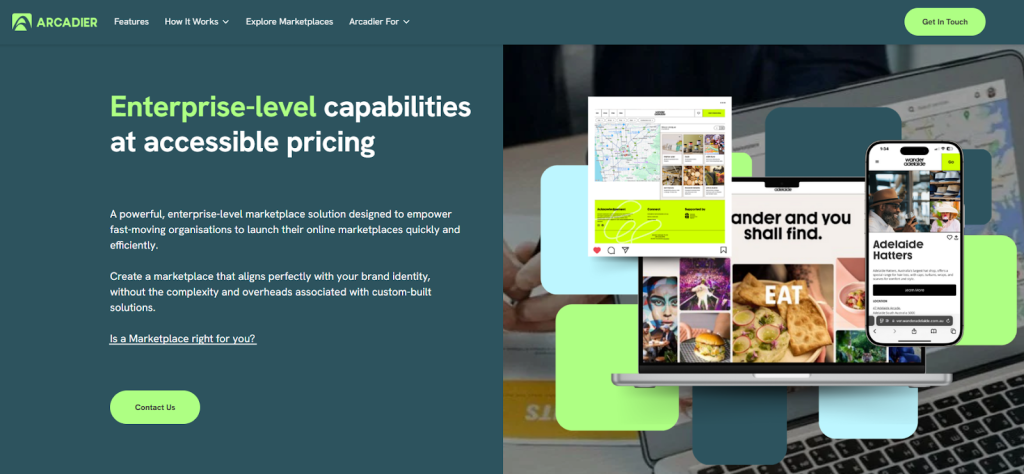
Arcadier is a globally recognized enterprise-level eCommerce marketplace software that enables quick marketplace deployment, helping businesses accelerate time-to-market. With its cloud-based, API-driven architecture, Arcadies enables enterprises to launch and scale marketplaces across a variety of verticals. The platform is designed to support marketplace agility and operational excellence. Its modular design allows enterprises to configure marketplaces to their business logic.
Enterprises can create custom modules and test them through its proprietary plugin engine, aligning precisely with their operational requirements. This enables introduction of unique functionalities and tailored workflows. In addition, Arcadier provides a scalable, future-ready foundation that helps businesses adapt to the increasing growth and expand their eCommerce operations.
Salient Points:
- Headless architecture
- API-based customization options
- Quick templated deployments
- Offers dedicated technical support
- Comprehensive vendor management tools
Ratings: 4.3/5
8. Marketplacer
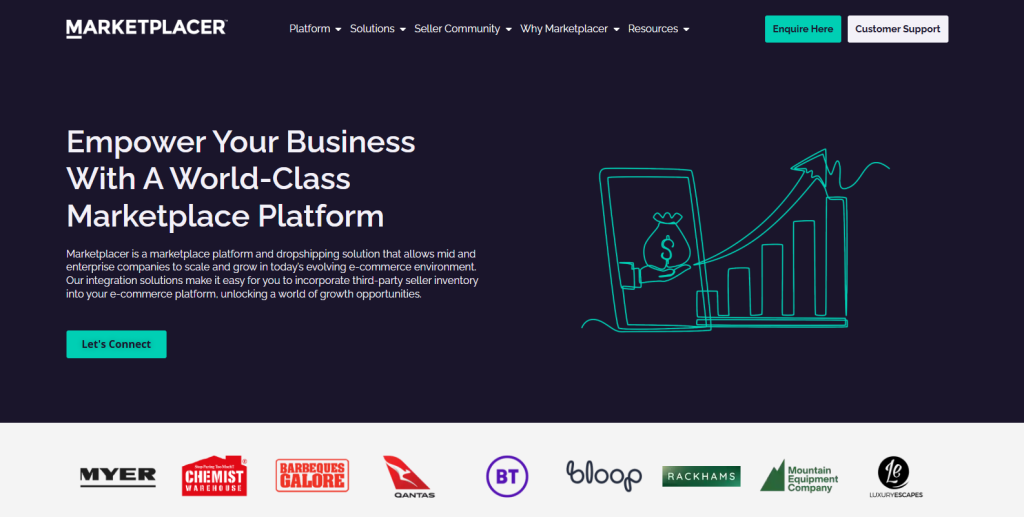
Marketplacer is a well-known multi-vendor marketplace software that empowers businesses to build sophisticated marketplace websites with ease. The platform has established itself as a well-known enterprise-grade solution that supports diverse business models, whether it’s B2B, B2C or niche marketplaces.
Marketplacer offers a comprehensive suite of features for efficient eCommerce operations and provide a seamless buyer experience. The platform’s advanced analytics and tools dashboard offers actionable insights to admins to oversee platform performance and KPIs, and optimize their operations and marketing strategies accordingly.
Known for its operational excellence, the software is highly customizable, allowing businesses to personalize the marketplace according their distinct business needs. Additionally, its API-first infrastructure integrates effortlessly with third-party systems.
Salient Points:
- Offers both hosted and API based integration options
- Quick market deployment
- Strong backend functionality
- Third-party integrations may slow down the system
Ratings: 4.3/5
Leverage a Feature-Rich Multi-vendor eCommerce Platform
9. Magento
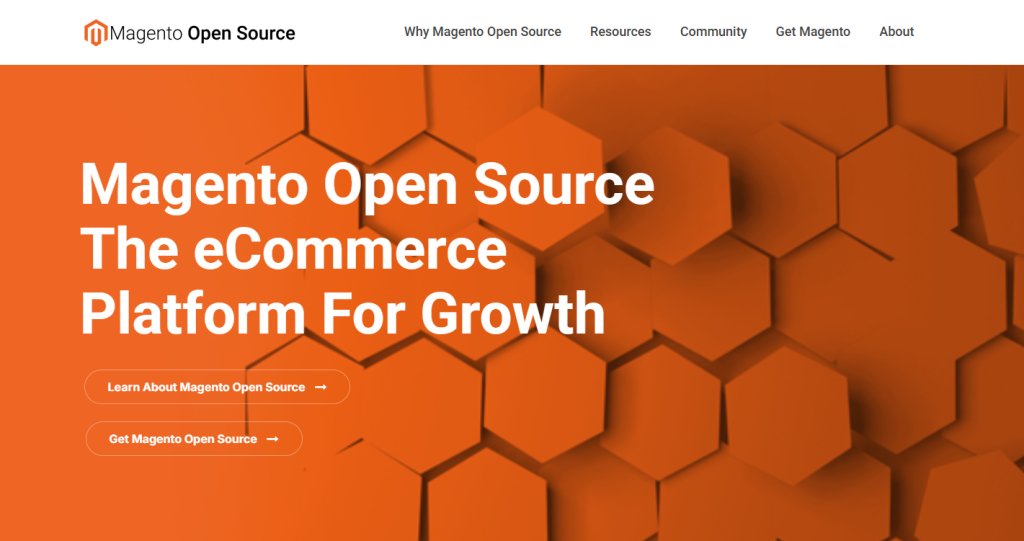
Magento which is now known as Adobe Commerce is a notable eCommerce marketplace platform that powers scalable multivendor marketplaces with diverse business models, whether B2B, B2C, etc. Built on an open-source framework, the software empowers enterprises to design and manage multi-store operations from a single unified backend. It offers a highly modular and adaptable architecture allows businesses to extend functionality, integrate third-party apps and deliver a personalized experience.
Enterprises choose Magento for its extensive scalability that allows businesses to expand globally and grow. The platform exceptionally handles increasing traffic, listings and transactions without any performance dip. Additionally, it complies with industry-best practices to keep the user data safe and secure. However, the businesses need a skilled in-house technical team for any development or customization due to its open-source architecture.
Salient Points:
- Open-source eCommerce marketplace platform
- Offers complete control over design and functionality
- Efficiently scales for global operations
- Longer development timeline compared to other solutions
- Complex hosting requirements needing specialized configurations
- Requires an in-house technical team for coding, designing testing
Ratings: 4/5
10. Kreezalid
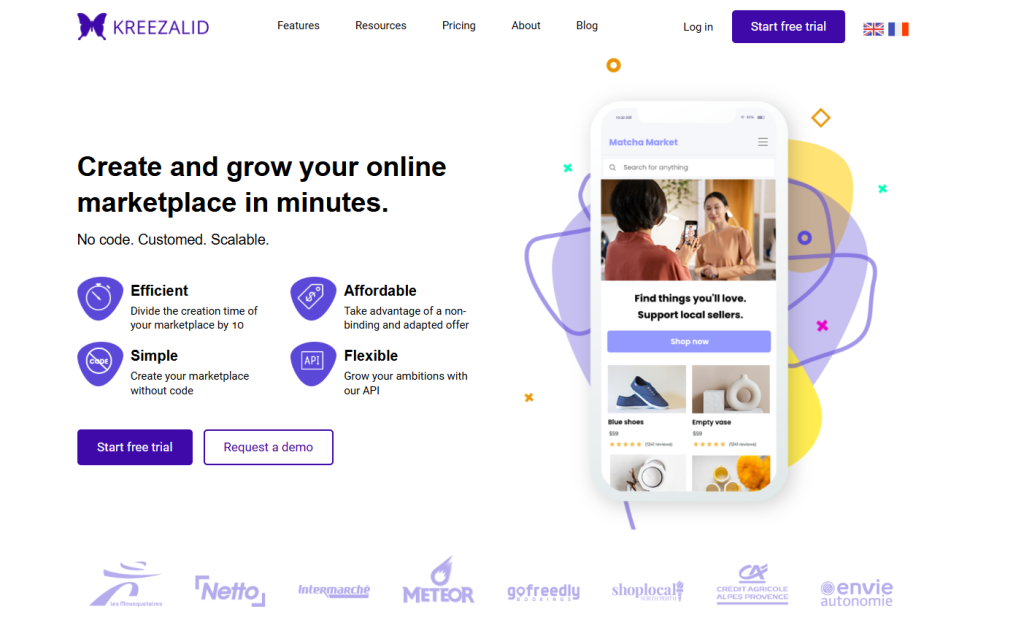
Kreezalid is a distinguished SaaS-based eCommerce platform that empowers businesses to build a scalable eCommerce marketplace quickly and cost-effectively. Known for its user-friendly interface and no-code marketplace builder, it allows businesses to build a fully functional marketplace that can handle multiple users at once. The solution eliminates extensive development overhead with a readily available framework that includes extensive marketplace features right from the outset. It provides an agile framework to maintain a brand consistency and operational control.
Additionally, with a strong emphasis on usability, Kreezalid delivers a smooth, intuitive and refined user experience for all stakeholders involved. It integrates a responsive design, intuitive dashboard and advanced search filters to enhance the appeal of the app.
Salient Points:
- Rapid deployment with low development dependency
- White-label customization for custom branding
- Monthly subscription-based pricing that accumulate over time
- Limited backend flexibility reported by users
Ratings: 4.4/5
Which is the Best Multi-Vendor eCommerce Platform — Comparing the Top Solutions
Below is a detailed comparison of the best multi-vendor eCommerce platforms for enterprises discussed above, evaluating each based on its hosting flexibility, pricing model, source code ownership, free demo and technical support offered. This precise information will thus help you make an informed decision and choose a solution that meets all your business requirements:
| Software | Hosting | Pricing | Source Code Ownership | Free Demo | Technical Support |
| Yo!Kart | Self-hosted infrastructure | One-time cost; lifetime license | Yes | Yes, both instant & live | 1 year Free |
| BigCommerce | SaaS-based | Recurring subscription costs | No | 15 days free trial | Via phone, chat and ticket |
| CS-Cart | On-premise & Cloud | One-time & subscription | Yes, but for a limited time period | 14-day free trial | Yes |
| Shopify Plus | SaaS-based | Monthly or annual subscriptions | No | 3-day free trial | Mainly via chat only |
| Mirakl | SaaS-based | Monthly or annual subscriptions | No | Yes; via scheduled session | No |
| WooCommerce | On-premise | Based on chosen extensions & hosting | Yes | Yes | Yes |
| Arcadier | SaaS-based | Subscription-based | No | No | No |
| Marketplacer | SaaS-based | Based on quote | No | No | Yes; via documentation |
| Magento | Open Source | Free; price of extensions & plugins vary | Yes | Yes | Community support only |
| Kreezalid | SaaS-based | Subscription costs | No | Free 7 days trial | Via email & live chat |
Key Criteria Businesses Should Consider Before Choosing a Multi-vendor eCommerce Platform
With numerous multi-vendor eCommerce platforms available in the industry, choosing the best for your business requires a keen understanding of business requirements. We’ve prepared a list of some important factors that one should consider before making a commitment. The following list will help you evaluate the software accordingly and choose what’s best for your business:
1. Feature Set: An enterprise-ready marketplace platform must provide a comprehensive suite of features to ensure that your business operations work smoothly without any compromise. Hence, evaluating a software before-hand is essential to make sure the platform boasts a rich feature set.
2. User Experience & Design: Choose a software that offers a clean, intuitive user-interface to make sure that the platform works smoothly and responds quickly to user queries.
3. Pricing Model: Selecting a pricing model that maintains a balance between affordability, functionality and control is essential. Thus, it is advised to evaluate not only the pricing models by different providers but the offerings associated with them to clearly asses the cost-benefit ratio.
4. Scalability: A scalable multi-vendor eCommerce platform ensures that businesses adapt to the business growth without any compromise. Henceforth, assess the software based on its scaling capabilities to expand your eCommerce operations efficiently across the world.
5. Customization: Distinctiveness is an essential element while launching a multi-vendor marketplace in this evolving eCommerce industry. As the competition intensifies, businesses should consider an eCommerce platform that allows them to tailor their website according to their business ethos to stand out and compete in the industry.
6. Client Testimonials: Check client reviews and testimonials on different reviewing sites like Capterra, G2, Software Advice to evaluate the existing and previous client experiences to make an informed decision.
7. Free Demo: Modern eCommerce platforms offer free demo or trial, allowing businesses to assist the software functionalities first-hand and experience the software. This helps you evaluate the features, functionalities and workflows before committing.
8. Technical Support: Select a provider that offers dedicated technical support after-purchase to ensure that the marketplace works smoothly without any bugs or errors.
Adopt a Multi-Vendor eCommerce Platform that Meets All Your Business Requirements
Conclusion
Multi-vendor eCommerce platforms have today brought a most transformative change in this hypercompetitive eCommerce industry, enabling businesses to streamline operations and expand their business globally while delivering exceptional user experiences. Thus, selecting the right multi-vendor eCommerce platform is essential, whether an enterprise is aiming to build a B2B, B2C or niche marketplace. Enterprise-grade solution like Yo!Kart strikes a perfect amount of balance between scalability, customizability and performance. By investing in a future-ready platform, enterprises can thus maximize their ROI and establish a strong foothold in the industry.
FAQs
Q 1. What is a multi-vendor eCommerce platform?
Ans. A multi-vendor eCommerce platform is a ready-to-deploy framework that allows you to build a fully functional multi-vendor eCommerce marketplace. Engineered with precision, these platforms integrate core features of a multi-vendor marketplace from scratch, allowing you to accelerate the time-to-market and launch a multi-vendor eCommerce marketplace with minimal investment.
Q 2. Why should I choose a multi-vendor eCommerce platform instead of building one from scratch?
Ans. Multi-vendor eCommerce platforms are pre-built frameworks that allows you to save a considerable amount of time and cost, associated with custom development. They provide a proven, tested framework with essential in-built features, functionalities and business APIs. As a result, businesses can launch a scalable, fully functional marketplaces, prioritizing branding and marketing rather than technical complexities.
Q 3. How to choose the right multi-vendor eCommerce platform?
Ans. Choosing the right multi-vendor eCommerce platform for your marketplace requires a well-thought-out strategy to evaluate the software solutions on their feature offerings, pricing, customizability, client testimonials, vendor reputation and technical support offered. Additionally, it is advisable to look for scalability extent and performance of the software to choose a future-ready solution.
Q 4. Which is the best multi-vendor eCommerce platform for enterprises?
Ans. Out of the many software solutions available in the industry, Yo!Kart stands as the best multi-vendor eCommerce platform for enterprises, allowing you to build a future-ready, scalable multi-vendor marketplace. Its rich suite of features, one-time payment model, robust clientele, multilingual & multi-currency support, customizability and dedicated technical support makes it an excellent choice of enterprises planning to launch a multi-vendor eCommerce marketplace.




